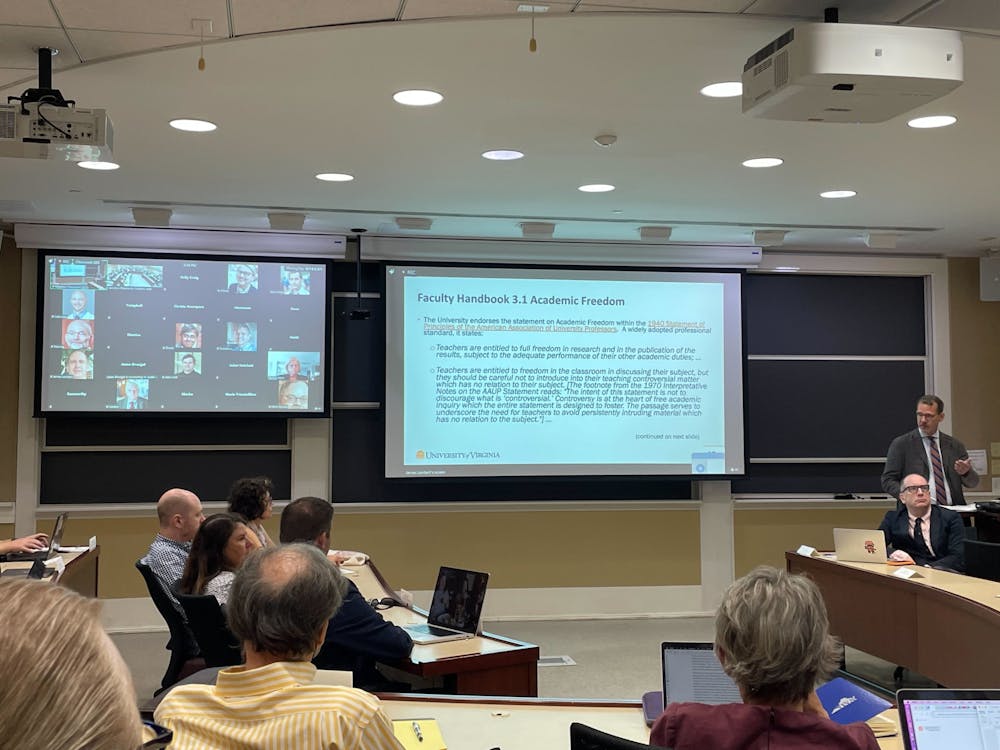In its first meeting of the semester, the University's Faculty Senate hosted Ian Baucom, executive vice president and provost, for a discussion about academic freedom at the University, including what free speech protections faculty have as both private citizens and University employees. Baucom also stated that the right to free expression as private individuals can mutually exist with the University faculty’s commitment to academic freedom, and that in the classroom professors should encourage free discussion, inquiry and expression.
Baucom responded to a set of questions posed by the Diversity, Equity and Inclusion subcommittee of the Faculty Senate. In his discussion, Baucom gave the Faculty Senate a brief overview of how he personally defines academic freedom at the University. According to Baucom, those affiliated with the University maintain the right to social and political criticism and to criticism of the University.
“The Constitution guarantees faculty and other employees and students robust free speech rights as private citizens,” Baucom said. “At the same time, it is important to remember that all government employees, including public university faculty, have an obligation to ensure that their private views are not the statement of the University."
Baucom was originally set to answer these questions pertaining to academic freedom at a Faculty Senate meeting May 10, but the discussion was postponed after the Faculty Senate scheduled an emergency meeting for May 9, where they discussed the University’s forceful clearing of a “Liberated Zone 4 Gaza” encampment that consisted of students, faculty and Charlottesville community members.
Baucom clarified University policy surrounding academic freedom, saying that faculty have the right to interact in political spaces, but if doing so, they must make efforts to indicate that they are not speaking on behalf of the University — such as avoiding using their University emails when writing to political organizations.
Baucom also explained the faculty discipline process for allegations of misconduct in relation to academic freedom. He stated that anyone can bring complaints of faculty misconduct to the University and shared a proposed future policy, which would require that the faculty member in question meets with their dean after a complaint is received. He said that faculty members would not have the right to counsel at this meeting, but that they would if their case advanced to a peer review process.
In his remarks Baucom said that deans receive and review all complaints and have the authority to decide whether a complaint is false or illegitimate. He stated that the purpose of these policies is to create a safe environment to learn and work at the University.
English Prof. Mark Edmundson asked a follow up question to Baucom’s statements on faculty discipline, asking him whether anyone could register a complaint for anything a faculty member says in class, writes or publishes.
“That [students, faculty and staff] could register a complaint about the classroom speech on the part of a professor, not only to me sounds alarming, I’m beginning to be alarmed,” Edmundson said.
Baucom said that the University couldn’t limit those who file complaints to only include some faculty members because it would negatively impact those not technically affiliated with the University — such as outside researchers working with University-affiliated researchers — who wish to directly file complaints, but said that he understands Edmunson’s concerns.
English Prof. Susan Fraiman also expressed a similar concern about the impact of allowing anyone to register complaints, noting her worry that faculty teaching topics relating to diversity, equity and inclusion could be targeted by complaints.
“The idea that anyone can object to what I'm saying about transgender [rights] in my classroom is really alarming and chilling.” said Fraiman. “I just feel as if conversations about this have to be contextualized in terms of this particular moment.”
While much of the meeting was focused on academic freedom, the Faculty Senate also discussed a report on religious diversity and belonging and introduced Michael Kennedy as the new Board of Visitors faculty representative. Kennedy shared that the religious diversity and belonging report was previously discussed at a Board of Visitors meeting Thursday and that the Board voted to endorse a broad notion of support for religious inclusivity at the University.
Baucom, who spoke on the findings of the report, noted that the University administration plans to act immediately on some of the recommendations of the Task Force on Religious Diversity and Belonging — a University-run working group created in December with the aim of better understanding the experiences of religious faculty, staff and students at the University.
Among the recommendations were expanding and improving the number of prayer spaces on Grounds and recruiting more faculty specializing in areas of study related to religious history, culture and conflicts in the Middle East.
“We cannot promote religion, but we want to be welcoming,” Baucom said.
The full Faculty Senate will meet again September 20.







